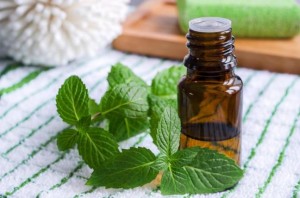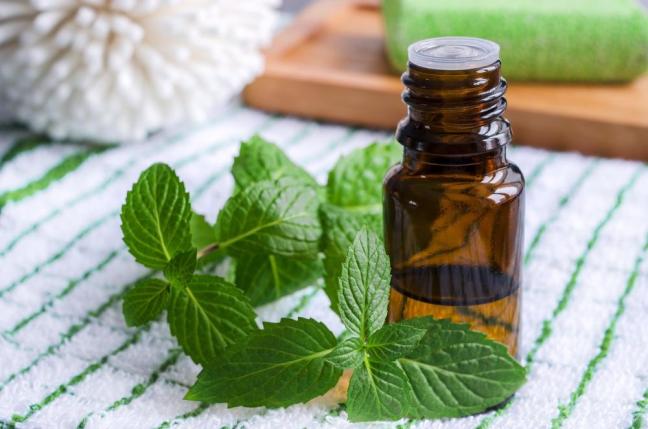 Pliny, the Roman scientist recorded the use of Peppermint for its medicinal properties as early as 79AD. The Romans and Greeks of the day used it to flavor their wines to aid digestion.
Pliny, the Roman scientist recorded the use of Peppermint for its medicinal properties as early as 79AD. The Romans and Greeks of the day used it to flavor their wines to aid digestion.
There is also mention of peppermint in thirteenth century Pharmacopoeias from Iceland. Dried peppermint was even found in the Egyptian pyramids.
What has made peppermint so popular for the last few hundred years? It’s incredible usefulness.
Here are 18 uses you can use peppermint oil –
Irritable Bowel Syndrome. Peppermint oil is often used in treating irritable bowel syndrome. It has soothing and anti-spasmodic effects. According to the US National Library of medicine, 8 out of 12 tests show that both adults and children experience significant relief from IBS symptoms when taking 180-200 mg enteric-coated peppermint oil.
Stomach Cramps. Peppermint oil calms your stomach muscles and increases the gastric juices in your stomach. This makes digestion easier. As a result it soothes cramps caused by indigestion or over indulgence in rich food. You can massage/apply it over the stomach to relieve the upset stomach.
Flatulence and bloating. Peppermint oil naturally contains thymol and eugenol, both of which helps to balance the intestinal flora and reduce the fermentation of undigested food.
As such, this helps to relieve bloating and gas, especially if the bloating is distended.
Nausea. Peppermint oil has been used for generations to relieve nausea. You can apply a drop of peppermint oil on your nose so you can smell it. Or you can make a tea with fresh peppermint leaves or use a prepared capsule which can be bought from most health shops. Or you can just use a diffuser to fill up a room so that it can help relieve nausea.
Gastric Emptying Disorders. Peppermint oil has been found to help patients who suffer from an inability to properly empty their gastric region. This can take the form of mild constipation that doesn’t allow for all waste to be passed. Leaving waste in the gut can be very bad for your gastric health as it will decay there. Drinking peppermint oil can help your body to eliminate waste fully.
Colic in babies. Because peppermint is so helpful in soothing gastric problems and relieving stomach cramps it is also a wonderful treatment for colic. However please note that when treating an infant, consult your medical practitioner or homeopath before administering any medications to your baby.
Fever treatment. Peppermint has a naturally cooling effect. Place a few drops in a bowl of water and use this to moisten a face cloth. Squeeze the cloth out and lay it across the brow of the fevered person to help relieve the heat and sooth their fever.
Sunburn. Another thing peppermint’s cooling effect is good for is sunburn. Many after sun lotions add a few drops of peppermint oil to cool the skin. You can add a few drops to your bath or in water in a spritzer bottle to cool sunburned skin. Like with all burns, make sure that the skin is not raw or broken before applying anything to it.
Skin Irritations and Itching. Peppermint contains menthol which soothes inflammation. If you mix peppermint oil in a base cream or base oil it can be used on skin irritations. Such as those caused by poison ivy, insect bites and even eczema.
Natural Insect repellent. Flies hate the smell of peppermint oil. You can put a few drops on a cloth by your door or add some to a spritzer and spray it around the room to repel flies. Or you can apply straight onto your clothes. It smells really great too!
Tension headaches. A small study supported by the University of Maryland medical centre, found that Peppermint oil can be helpful in relieving tension headaches. Simply dilute a few drops of peppermint oil and rub it across the top of your forehead right next to your hairline or around the temples.
Enhancing Memory and mental alertness. Smelling peppermint oil has been found to have a mentally refreshing effect. It can help you to remember more easily and also make you feel more awake and alert.
Stress relief. Peppermint has a soothing and energizing effect which can make a big difference to your stress levels. Add a few drops to your bath or to your steamer. The peppermint will sooth your synapses and relieve your tension.
Muscle pain relief. Because of its cooling and anti-spasmodic effects, peppermint will sooth aching muscles if applied topically. It helps to increase the blood circulation in the affected area, hence enhance healing and provides relief.
Compare to other pain relief products out in the market, peppermint oil is a much better choice because it is natural and more importantly, it smells good!
Fresh breath and healthy teeth. Peppermint has been used for hundreds of years as a breath freshener. It eliminates odors and has a wonderful smell. Peppermint also has natural anti-bacterial and anti-fungal properties. This helps it to clean teeth by cleaning out decay-causing bacteria.
Teething babies. Peppermint oil mixed with coconut oil can be used on babies teething gums. It is anti-inflammatory and soothing to the gums, making your baby much more comfortable.
Healthy Hair and Scalp. Because it is so stimulating to your cells peppermint promotes hair growth. Add a few drops to your shampoo to stimulate hair growth. The menthol is also great for your scalp. That is why so many anti-dandruff shampoos have menthol in them.
Clearing your Sinus. Another handy thing the menthol in peppermint oil is famous for is clearing a stuffy nose. If you have a head cold or flu put a few drops of peppermint oil in a bowl of steaming hot water (or an inhaler if you have one) and breath in the steam. It will help to clear your sinuses. It will also help to ease the headache and nausea and make you feel fresh.
Is there a difference between peppermint oil and peppermint extract?
There is a big difference between Peppermint oil and Peppermint extract. Peppermint oil is the pure, concentrated oil of the leaves and stems. Concentrated oil is taken from the plant by distillation. Pure peppermint oil is very strong and should be used according to proper guide lines.
Peppermint extract comes from soaking the plant in a drawing substance – usually alcohol. The flavor is extracted into the alcohol. The extract that you buy is mostly a substrate with a little flavoring in it. It is diluted.
Do take note that NOT all the essential oils are created equally. There is a big difference in terms of quality for the price you paid for essential oils.
All oils and natural remedies should be used under guidance of the manufacturer, or a health professional or aroma therapist. Essential oils are medicine and should be treated with due caution.
Besides using peppermint oil, if you suffer from frequent digestive issues like diarrhea, constipation, bloatedness, gas, acid reflux, nausea, go to the next page and watch the 3 tips to reduce these digestive-related issues –
References
http://www.ncbi.nlm.nih.gov/pubmed/16121521
https://umm.edu/health/medical/altmed/herb/peppermint
About the Author:
Emma Deangela is the best selling author of The Alkaline Diet Program and 80/20 Fat Loss. She has helped over tens of thousands of men and women to lose weight and transform their health with sound nutrition advice. Check out her 3 natural alkaline tricks video to lose more than 18 lbs in 3 weeks.
Take a look at your tongue in your mirror and share with us what you see!
Please help them by sharing this eye-opening article with each of them using any of the social media and email buttons below.


Leave a Reply